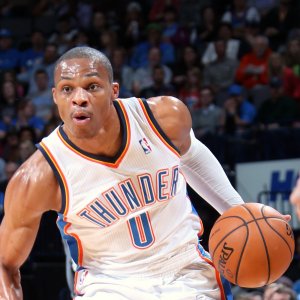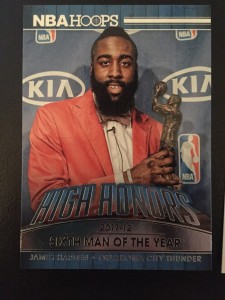The world in which this article is necessary seems wildly improbable, and yet here we are. Russell Westbrook is going to finish the year averaging a triple double. On a September 21 episode of now-cancelled Any Given Wednesday, Bill Simmons and Vince Staples both un-controversially agreed that such a statistical feat was impossible. Barely half of a year later, we’re almost bored with the achievement’s banal inevitability.
Oddly, the emerging consensus is that James Harden, not Russell Westbrook, is the looming Most Valuable Player. Before this year, averaging a triple double was something worth imagining, but not something worth predicting[1]. Like a small child yearning world peace. Sure, world peace would be amazing, but it’s just not possible, and you’d be naïve to suggest otherwise. Now the basketball world is faced with impending world peace, and it doesn’t seem impressed.
Weirder and more unlikely still is the fact that this doesn’t feel all that weird or unlikely. In fact, it feels appropriate, and just. Harden’s Rockets are, as of this writing, a seven and a half wins better than Westbrook’s Thunder. Harden is the focal point of a team that could be best described as the Platonic Ideal of Modern Basketball. While Westbrook’s numbers are superlative, numbers can’t defeat the Warriors in a seven game series, but Harden’s Rockets, the thinking goes, maybe could.
Russell Westbrook is outscoring James Harden this year. That we know. Westbrook is outscoring everybody this year, actually; his 31.8 points-per-game, leads the NBA. He’s also outrebounding James Harden, 10.6 to 8.0. Harden has advantages in assists, field goal percentage and minutes played. Westbrook is outperforming Harden when it comes to steals, and on a per game basis Russ is turning the ball over slightly less. It’s fair to say that Westbrook’s numbers are better than James Harden’s. But we already knew that, and we don’t really care. The most important statistic, in the eyes of Westbrook detractors, is his comically large 41.8 Usage Rate[2]. He’s a ball hog.

Everybody hates a ball hog. Especially a point guard. We see ball hogging as antithetical to team play and prohibitive to winning basketball. Since the days of peach baskets, this has been a team game with no patience for selfish play. And yet we devote hours of thought to the NBA’s most celebrated individual achievement, the Most Valuable Player Award. There’s a tension here that basketball fans seem to be avoiding. If team play is true basketball self-actualization, then individual honors are without value. But that’s not the case, because clearly we do care about, at the very least, this particular individual honor. This tension usually leads to two schools of thought. The first being, “The MVP is the best player on the best team,” and then second being, “the MVP is the player having the best individual season.”
For the past two years, Stephen Curry has been both the player having the best individual season and the best player on the best team. As such, these two schools of thought have not been in conflict in quite some time. But with the addition of Kevin Durant to the Warriors, we’re no longer sure who the best player on the Warriors is, and we’re not even completely sure if the Warriors are the best team at all. And so, in some sense, Westbrook and Harden are now the representatives of these two philosophies. Westbrook is unassailably the player having the most individual success. James Harden is the player whose individual success seems to be resulting in the most wins. As best we can tell, Harden’s individual success is worth about eight more wins than Westbrook’s, so the “Best Player on the Best Team” folks have anointed Harden.
But the Spurs are six and a half games ahead of the Rockets at this very moment. Six and a half games is not all that different from seven and a half games, and yet talk of the Spurs’ Kawhi Leonard for MVP is sparse. It seems to be suggested out of pity when suggested at all. Now, there’s a pretty reasonable explanation for this: Leonard’s numbers just aren’t as good as Harden’s. Harden scores more points, dishes more assists and grabs more boards. The numbers matter, but only circumstantially. This draws me towards the following conclusion: There are not two different criteria for determining MVP. Rather, there are two different interpretations of the same criteria. And that criteria is this: The MVP is the player having the most interesting season.
Think about the 96-97 season. Karl Malone won the MVP. Was Karl Malone better than Michael Jordan? Not in any meaningful sense. But giving MJ the award over and over felt boring. It wasn’t that interesting. How about Steve Nash’s 2006 MVP? Was Nash really more “valuable” than LeBron’s 31.4 points per game? No way, but a tiny white guy from Canada running a basketball court like a soccer pitch was really interesting. This has always been the case and we’ve simply pretended it’s not. The MVP has nothing to do with “value”, and everything to do with how interesting a player’s season is.
So who’s having a more interesting season? Is it Russell Westbrook’s triple double? How interested are we in the fact that his rebound and assist averages hover slightly above the number of fingers we have? How interesting do we find James Harden? In what meaningful way does his beard affect the way we think about his up-tempo offense?

When we thought that averaging a triple double was impossible, it seemed fascinating. To average a triple double, a player would have to be some kind of monster, a 6’7 point guard who could get to the basket and throw lobs. Our heads danced with the thought of Chris Paul trapped in Draymond Green’s body with Klay Thompson’s shooting touch. But as it turns out, none of that was necessary. All we needed to find a player who could average a triple double was a modernized NBA. Possessions are shorter now, and that means there are more of them, creating more field goals and more assists. Players launch threes from all over the court now, creating longer rebounds, more easily attainable for quick guards like Westbrook. As soon as a triple double friendly environment became the status quo, a triple double didn’t feel quite so super natural, and that made it less interesting.
Harden’s tale, on the other hand, is as fascinating as ever. Traded by Westbrook’s Thunder to the Rockets for Steven Adams and basically nothing else, Harden blossomed from the league’s best sixth man to, now, arguably, its most fun player. After toiling around with Dwight Howard, the Rockets brought in Mike D’Antoni and propelled the Rockets, and Harden, into title contenders who play fun basketball. People are fascinated by it.
Westbrook’s narrative isn’t so boring either, of course, being spurned by Kevin Durant this offseason. In Westbrook’s first opportunity to be the best player on his own team, he’s responded by having the best statistical season since 1962. But we expected this narrative. The entire league saw this coming, whereas Harden’s leap forward has taken all but Rockets fans by surprise.
All this number crunching, comparing and contrasting PER and per-100 stats, it’s all hooey. The MVP is the player that you’re going to have the most fun talking about at the bar with your buddies. The MVP is going to be the player who gets the best articles written about him. If you can’t wait to watch every first-round-game your guy is in, then there’s your MVP. Oh, did I mention the Rockets and Thunder are currently on pace to play each other in the first round?
[1] I’m well aware that Oscar Robertson averaged a triple double in the 1961-62 season. 1961-62 is a whole different world in the NBA, and we shouldn’t even bother comparing Westbrook’s 2017 to Robertson’s 1962.
[2] Usage rate is a statistic that measures the percentage of a team’s possessions that end in either a shot or assist by a player. Westbrook’s 41.8 would be the highest ever.

